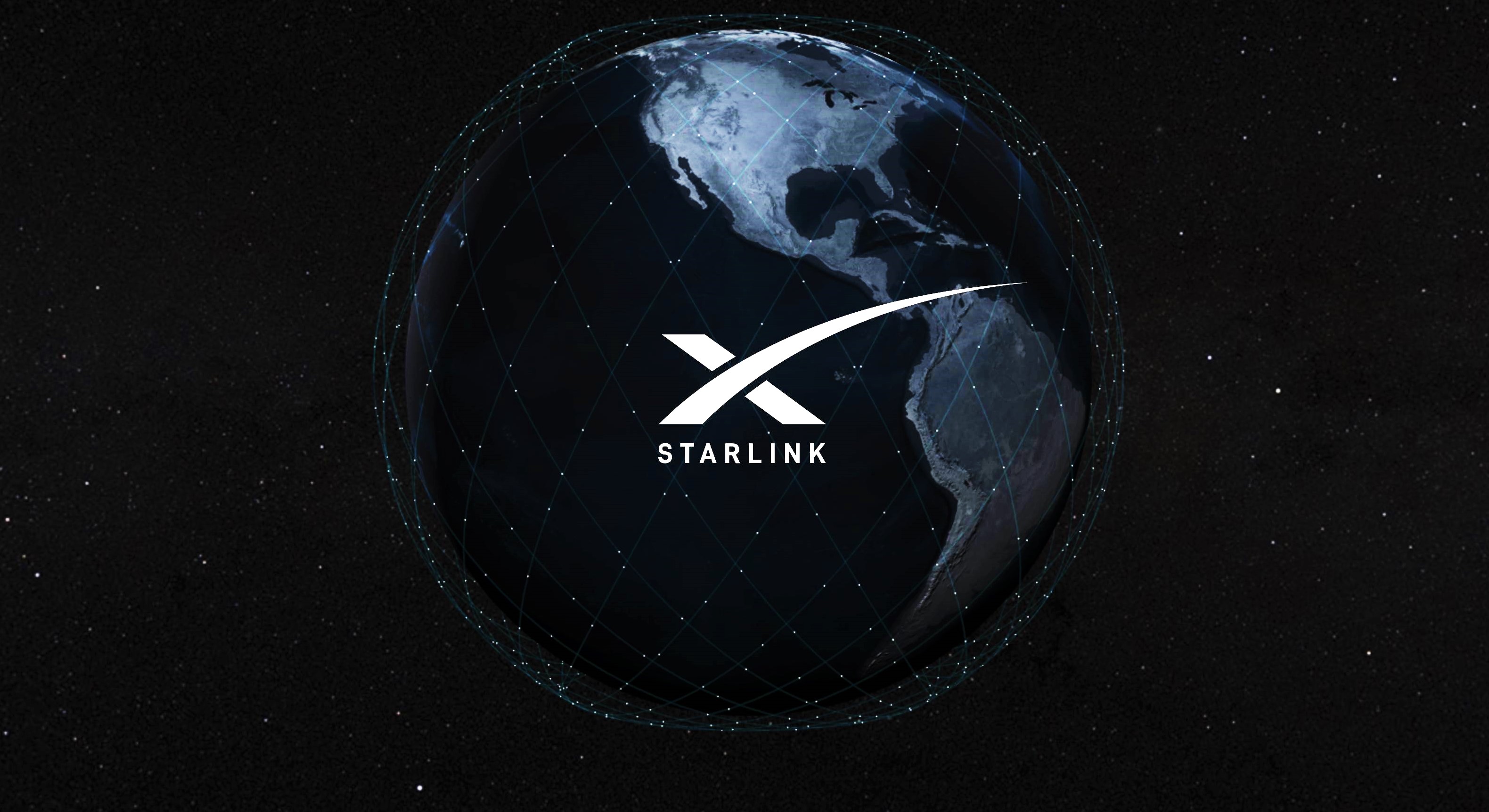

News
SpaceX set to deploy another large batch of internet satellites as Starlink constellation expands
For the third time in less than four weeks, SpaceX has announced a new 60-satellite Starlink mission, making it the second Starlink launch scheduled in the first month of the new year.
This mission will be the company’s fifth dedicated Starlink launch, referring to the fact that SpaceX is using all of the performance of Falcon 9 for its own internal purposes. Comprised of 60 flat-packed satellites, SpaceX completed its first dedicated Starlink launch – known as Starlink v0.9 – in May 2019, followed by the first launch of 60 finalized “Starlink v1.0” satellites on November 11th, a mission known as Starlink-1.
Barring delays, the next Starlink v1.0 launch – Starlink-2 – will be SpaceX’s 14th and final launch of the year and is scheduled to lift off no earlier than 11:40 pm ET, December 30th (03:40 UTC, Dec 31), a mission the company announced on November 24th. Barely two weeks later, SpaceX announced media accreditation for Starlink-3, scheduled to launch in January 2020.
Now, just ten days after announcing Starlink-3, SpaceX has announced plans for Starlink-4. Scheduled to launch no earlier than “late-January”, Starlink-4 is now the third Starlink mission SpaceX has announced in less than four weeks, all three of which are scheduled to launch within the next six weeks.
As previously discussed on Teslarati, the fact that SpaceX announced two Starlink missions in two weeks meshed well with the company’s goal of performing up to 24 dedicated Starlink launches in 2020.
“Barely two weeks after SpaceX opened media accreditation for Starlink-2, the second launch of finalized ‘v1.0’ satellites and third dedicated launch overall, the company has announced that that late-December mission will be followed by another Starlink launch in January 2020. This tracks almost exactly with SpaceX’s reported plans for as many as 24 dedicated Starlink launches in 2020, a feat that would singlehandedly break SpaceX’s current record of 21 launches performed in a single year.”
Eric Ralph — December 10th, 2019
With SpaceX’s December 19th’s Starlink-4 announcement, it’s now abundantly clear that the company is putting its money where its mouth is with respect to what might otherwise be perceived as a Muskian pie-in-the-sky target. CEO Elon Musk is (in)famous for his tendency to sketch out timelines that probably are theoretically possible but inevitably fall prey to the numerous challenges often faced during ambitious aerospace projects.
As of now, SpaceX took a bit less than six months to go from its first 60-satellite Starlink v0.9 launch to its first Starlink v1.0 launch (Starlink-1). If schedules hold, SpaceX’s second Starlink v1.0 launch – Starlink-2 – will lift off about six weeks after Starlink-1, while Starlink-3 could follow just 1-2 weeks later in January 2020.
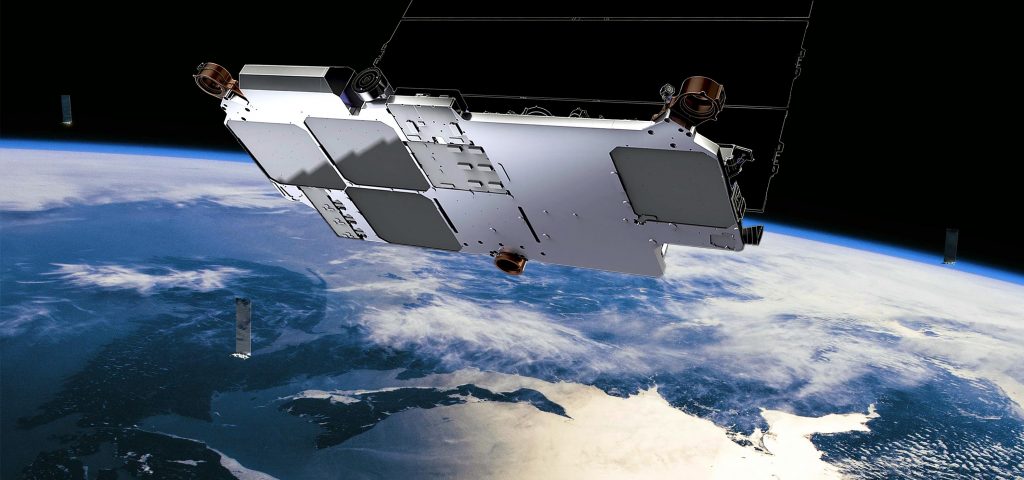
This is all to say that SpaceX is perfectly setting itself up for an average of two Starlink launches per month next year, so long as it continues to announce new missions every 2-3 weeks. Even if SpaceX falls short of that ambition due to any number of technical hurdles that could pop up next year, 15 or 20 Starlink launches would give the company a Starlink constellation more than a thousand satellites strong.
In recent months, SpaceX has indicated that Starlink will need at least 24 dedicated launches – 1440 satellites – to achieve uninterrupted global coverage, while as few as six launches (300 satellites) could enable service for customers in the northern US and southern Canada.
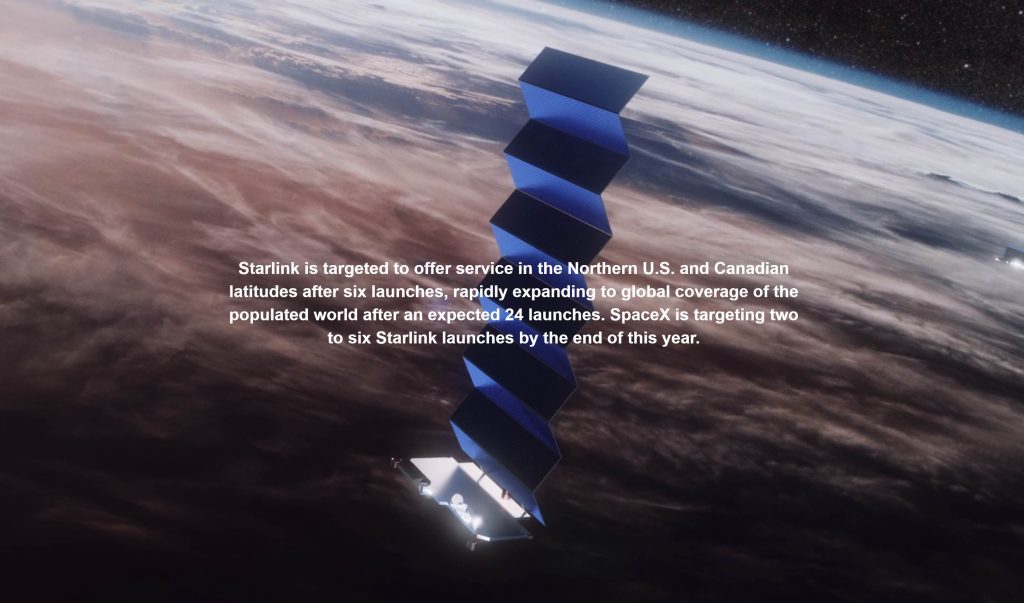
SpaceX COO and President Gwynne Shotwell believes the company can begin serving customers as early as mid-2020, ultimately maturing into an experienced internet service provider (ISP) in 2021. With almost 120 satellites already in orbit, if SpaceX can manage an average of 1.5 to 2 Starlink launches per month in 2020, the broadband internet constellation will have near-global coverage before the start of 2021.
For now, it looks like the first few months of the next decade will be jam-packed with SpaceX Starlink launches, not to mention the customer launches the company intends to complete on top of its own internal manifest.
Check out Teslarati’s Marketplace! We offer Tesla accessories, including for the Tesla Cybertruck and Tesla Model 3.
News
Tesla opens massive solar Supercharger station in California
The Supercharger opened to customers ahead of Fourth of July weekend, while Tesla continues phase two of construction on the site.
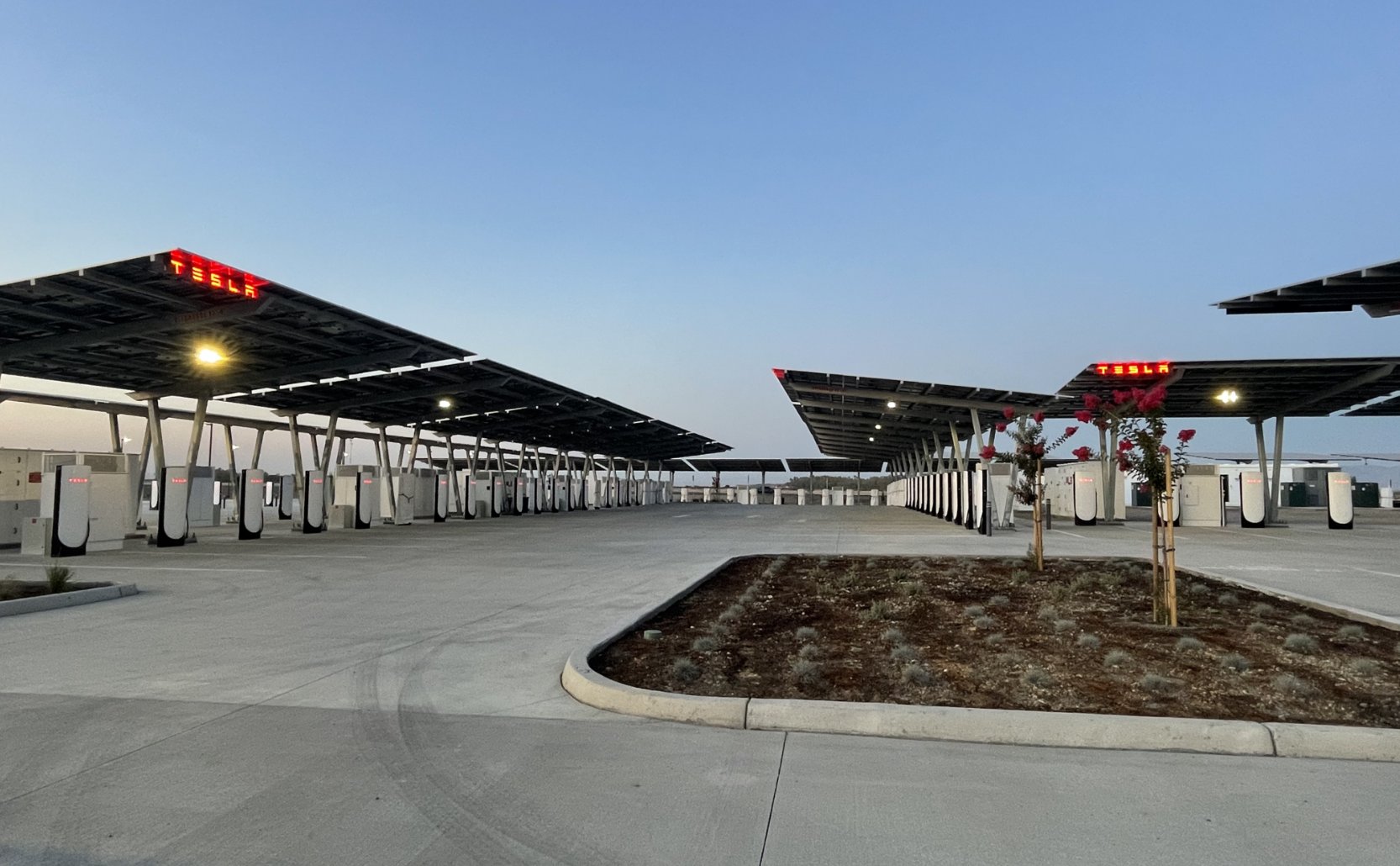
Tesla has officially launched the first several Supercharging posts at a massive station in California, notably including solar canopies and grid-scale batteries to offer completely renewable charging.
Last week, Tesla announced on X that it opened the first 84 Supercharger stalls of a planned 168-stall station in Lost Hills, California. Additionally, the massive Supercharger project features 11MW of solar canopies and 10 Megapack batteries for off-grid charging powered entirely by solar energy.
Tesla completed the first phase of the project just days ahead of the busy Fourth of July holiday weekend, adding that initial construction took just eight months. In addition to the remaining charging stalls, Tesla says it’s building a set of lounge areas, renderings of which can be seen below alongside current photos of the site.
Notably, the site also includes V4 charging posts for the company’s latest available charging speeds, and it’s located near the busy junction between I-5 and Highway 46 in Kern County.
“Thank you [Kern County] and [PG&E] for collaboration and approvals,” Tesla wrote in a follow-up post.
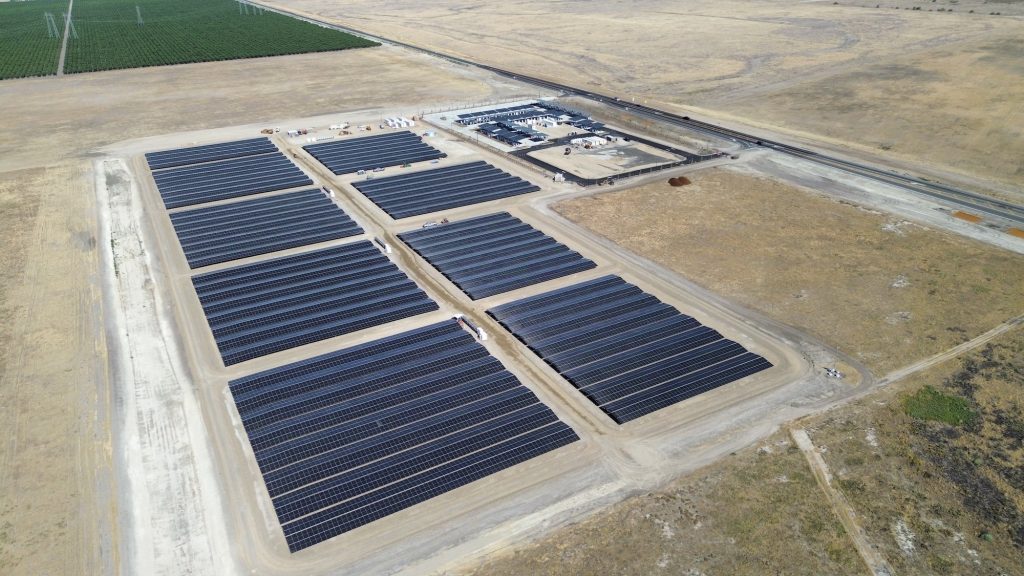
Credit: Tesla Charging | X
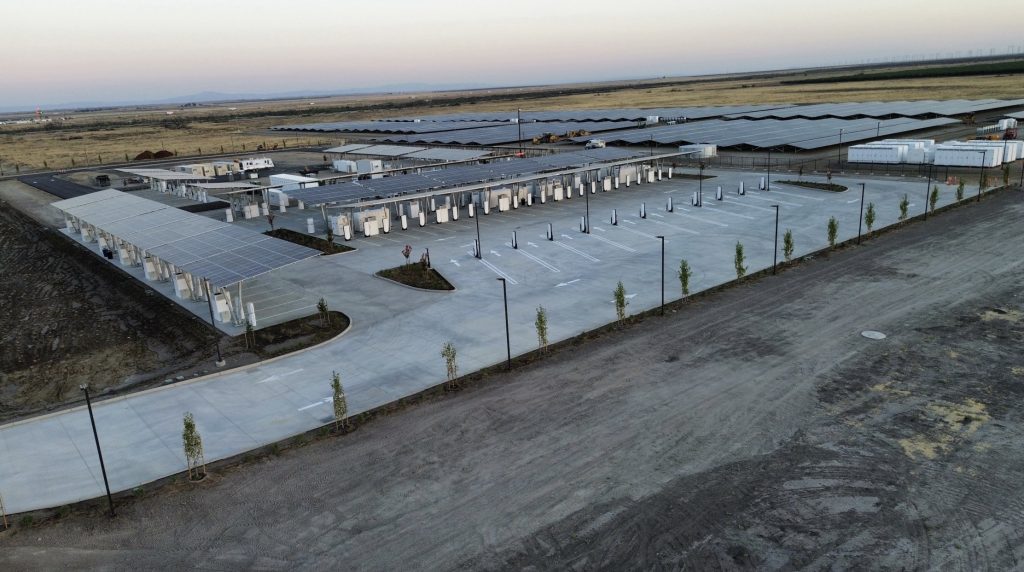
Credit: Tesla Charging | X
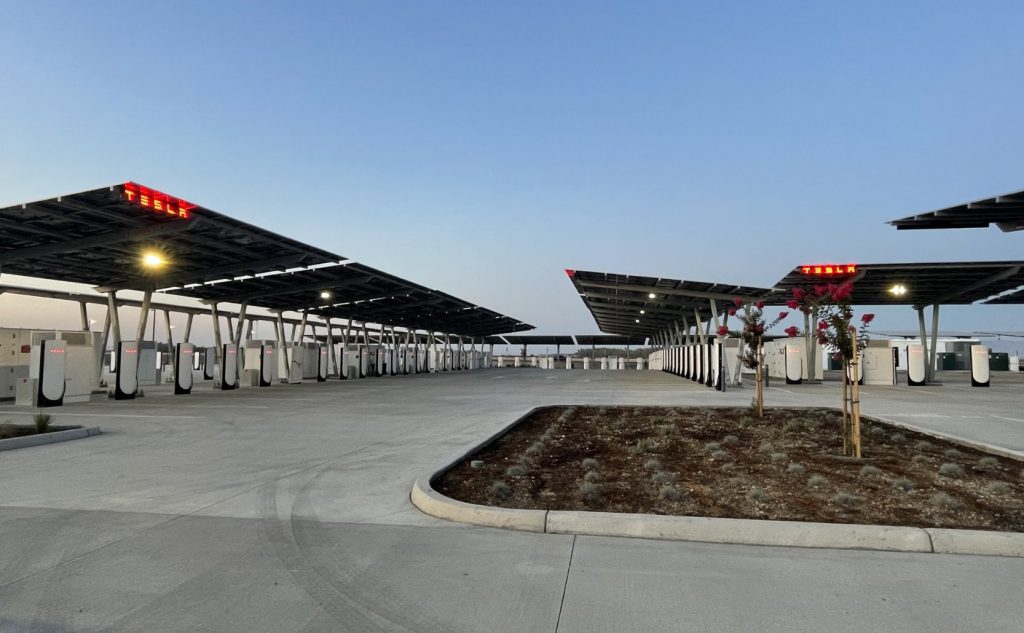
Credit: Tesla Charging | X

Credit: Tesla Charging | X
Tesla Supercharger Maps for North America, Europe, and Asia pic.twitter.com/0U5r0XRPyo
— TESLARATI (@Teslarati) July 2, 2025
READ MORE ON TESLA SUPERCHARGERS: Tesla launches ultra-fast V4 Superchargers in China for the first time
Testing at the LA Diner, plus Musk update on potential Tesla solar Gigafactory
The huge Tesla Supercharger station completed phase one of construction fairly quickly, especially given how long Tesla has been working on its unique Los Angeles diner, drive-in, and Supercharger location. Still, the company was seen performing some testing at the nearly-completed charging station earlier this month, and will reportedly be holding a job fair.
Elon Musk also responded on Monday morning to a post on X, suggesting that Tesla is “thinking about” building a U.S.-based solar Gigafactory in order to help support increased power needs with AI growth, and to bolster domestic solar production.
Tesla is building a new UFO-inspired Supercharger in the heart of Alien country
News
Tesla driver walks away from major accident with minor injuries
The driver sustained only minor injuries, and the exact cause of the crash remains under investigation.

The driver of a Tesla Model Y survived and walked away from a harrowing accident on Monday in California, only sustaining minor injuries despite the vehicle being impaled by a guardrail.
On Monday morning around 4:34 a.m., the Los Banos division of the California Highway Patrol (CHP) responded to the accident on I-5 near Panoche Road, involving a 23-year-old in a Tesla Model Y. According to a post on social media, the driver veered off the road for unknown reasons in the northbound lane, before crashing directly into the guardrail and impaling the vehicle.
You can read the full message and photos from Los Banos CHP below, as were shared in a Facebook post on Monday afternoon.
This morning a Tesla model y was traveling in the #1 northbound lane of I-5 north of Panoche Rd. For unknown reasons driver allowed V-1 to veer off the roadway, travel through a dirt center divide, and crashed into the fixed metal guardrail. Lucky for the driver he only sustained minor injuries and was able to walk away. Driving a vehicle requires 100% attention to the road. Avoid distractions and focus on driving.

Credit: CHP Los Banos (via Facebook)

Credit: CHP Los Banos (via Facebook)

Credit: CHP Los Banos (via Facebook)
In a statement to SFGate, CHP officer Myles Anderson said that the driver only sustained minor injuries, while no arrests are made and drugs and alcohol are not suspected to have been involved. The report also notes that Tesla’s “cruise control and lane assistance features” were activated, according to Anderson. However, it’s not entirely clear if this is referring to Supervised Full Self-Driving (FSD), or to the cruise control and lane assist features baked into Autopilot.
At the time of writing, CHP has not yet responded to Teslarati’s request for clarification and additional details on the matter.
Tesla Crash Safety Ratings across its lineup: pic.twitter.com/ny30R7ceji
— TESLARATI (@Teslarati) July 1, 2025
READ MORE ON TESLA SAFETY: Tesla rolls out crucial new safety feature aimed at saving children
The news comes after Tesla has touted its vehicles as incredibly safe for many years. In December, for example, the company highlighted receiving top safety scores from regulators on four different continents throughout the world, including from the National Highway Traffic Safety Administration (NHTSA) and the Insurance Institute of Highway Safety (IIHS) in the U.S.
Tesla has also listed the goal of making its vehicles the safest on the road throughout the years, both in the overall design of its vehicles and in its Autopilot and Full Self-Driving (FSD) programs.
Tesla Model 3 ranks as the safest new car in Europe for 2025, per Euro NCAP tests
Investor's Corner
Cantor Fitzgerald maintains Tesla (TSLA) ‘Overweight’ rating amid Q2 2025 deliveries
Cantor Fitzgerald is holding firm on its bullish stance for the electric vehicle maker.

Cantor Fitzgerald is holding firm on its bullish stance for Tesla (NASDAQ: TSLA), reiterating its “Overweight” rating and $355 price target amidst the company’s release of its Q2 2025 vehicle delivery and production report.
Tesla delivered 384,122 vehicles in Q2 2025, falling below last year’s Q2 figure of 443,956 units. Despite softer demand in some countries in Europe and ongoing controversies surrounding CEO Elon Musk, the firm maintained its view that Tesla is a long-term growth story in the EV sector.
Tesla’s Q2 results
Among the 384,122 vehicles that Tesla delivered in the second quarter, 373,728 were Model 3 and Model Y. The remaining 10,394 units were attributed to the Model S, Model X, and Cybertruck. Production was largely flat year-over-year at 410,244 units.
In the energy division, Tesla deployed 9.6 GWh of energy storage in Q2, which was above last year’s 9.4 GWh. Overall, Tesla continues to hold a strong position with $95.7 billion in trailing twelve-month revenue and a 17.7% gross margin, as noted in a report from Investing.com.
Tesla’s stock is still volatile
Tesla’s market cap fell to $941 billion on Monday amid volatility that was likely caused in no small part by CEO Elon Musk’s political posts on X over the weekend. Musk has announced that he is forming the America Party to serve as a third option for voters in the United States, a decision that has earned the ire of U.S. President Donald Trump.
Despite Musk’s controversial nature, some analysts remain bullish on TSLA stock. Apart from Cantor Fitzgerald, Canaccord Genuity also reiterated its “Buy” rating on Tesla shares, with the firm highlighting the company’s positive Q2 vehicle deliveries, which exceeded its expectations by 24,000 units. Cannacord also noted that Tesla remains strong in several markets despite its year-over-year decline in deliveries.
-

 Elon Musk1 week ago
Elon Musk1 week agoTesla investors will be shocked by Jim Cramer’s latest assessment
-

 News2 weeks ago
News2 weeks agoTesla Robotaxi’s biggest challenge seems to be this one thing
-

 News2 weeks ago
News2 weeks agoWatch the first true Tesla Robotaxi intervention by safety monitor
-

 Elon Musk1 week ago
Elon Musk1 week agoA Tesla just delivered itself to a customer autonomously, Elon Musk confirms
-

 News2 weeks ago
News2 weeks agoTesla Robotaxi rollout proves that Elon Musk still delivers, even if it’s late
-

 Elon Musk2 weeks ago
Elon Musk2 weeks agoxAI welcomes Memphis pollution results, environmental groups push back
-

 Elon Musk2 weeks ago
Elon Musk2 weeks agoElon Musk commends Tesla team on successful Robotaxi launch
-

 Elon Musk2 weeks ago
Elon Musk2 weeks agoElon Musk confirms Tesla Optimus V3 already uses Grok voice AI


















